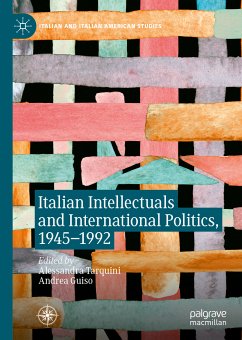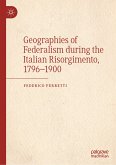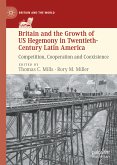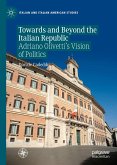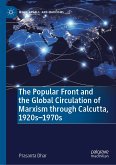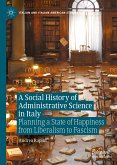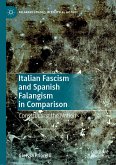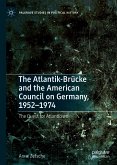Italian Intellectuals and International Politics, 1945–1992 (eBook, PDF)
85,59 €
inkl. MwSt.
Sofort per Download lieferbar
Italian Intellectuals and International Politics, 1945–1992 (eBook, PDF)
- Format: PDF
- Merkliste
- Auf die Merkliste
- Bewerten Bewerten
- Teilen
- Produkt teilen
- Produkterinnerung
- Produkterinnerung

Bitte loggen Sie sich zunächst in Ihr Kundenkonto ein oder registrieren Sie sich bei
bücher.de, um das eBook-Abo tolino select nutzen zu können.
Hier können Sie sich einloggen
Hier können Sie sich einloggen
Sie sind bereits eingeloggt. Klicken Sie auf 2. tolino select Abo, um fortzufahren.

Bitte loggen Sie sich zunächst in Ihr Kundenkonto ein oder registrieren Sie sich bei bücher.de, um das eBook-Abo tolino select nutzen zu können.
Italian intellectuals played an important role in the shaping of international politics during the Cold War. The visions of the world that they promulgated, their influence on public opinion and their ability to shape collective speech, whether in agreement with or in opposition to those in power, have been underestimated and understudied. This volume marks one of the first serious attempts to assess how Italian intellectuals understood and influenced Italy’s place in the post–World War II world. The protagonists represent the three key post-war political cultures: Catholic, Marxist and…mehr
- Geräte: PC
- ohne Kopierschutz
- eBook Hilfe
- Größe: 2.82MB
- Upload möglich
Andere Kunden interessierten sich auch für
![Geographies of Federalism during the Italian Risorgimento, 1796–1900 (eBook, PDF) Geographies of Federalism during the Italian Risorgimento, 1796–1900 (eBook, PDF)]() Federico FerrettiGeographies of Federalism during the Italian Risorgimento, 1796–1900 (eBook, PDF)128,39 €
Federico FerrettiGeographies of Federalism during the Italian Risorgimento, 1796–1900 (eBook, PDF)128,39 €![Britain and the Growth of US Hegemony in Twentieth-Century Latin America (eBook, PDF) Britain and the Growth of US Hegemony in Twentieth-Century Latin America (eBook, PDF)]() Britain and the Growth of US Hegemony in Twentieth-Century Latin America (eBook, PDF)96,29 €
Britain and the Growth of US Hegemony in Twentieth-Century Latin America (eBook, PDF)96,29 €![Towards and Beyond the Italian Republic (eBook, PDF) Towards and Beyond the Italian Republic (eBook, PDF)]() Davide CadedduTowards and Beyond the Italian Republic (eBook, PDF)128,39 €
Davide CadedduTowards and Beyond the Italian Republic (eBook, PDF)128,39 €![The Popular Front and the Global Circulation of Marxism through Calcutta, 1920s-1970s (eBook, PDF) The Popular Front and the Global Circulation of Marxism through Calcutta, 1920s-1970s (eBook, PDF)]() Prasanta DharThe Popular Front and the Global Circulation of Marxism through Calcutta, 1920s-1970s (eBook, PDF)117,69 €
Prasanta DharThe Popular Front and the Global Circulation of Marxism through Calcutta, 1920s-1970s (eBook, PDF)117,69 €![A Social History of Administrative Science in Italy (eBook, PDF) A Social History of Administrative Science in Italy (eBook, PDF)]() Andrea RapiniA Social History of Administrative Science in Italy (eBook, PDF)48,14 €
Andrea RapiniA Social History of Administrative Science in Italy (eBook, PDF)48,14 €![Italian Fascism and Spanish Falangism in Comparison (eBook, PDF) Italian Fascism and Spanish Falangism in Comparison (eBook, PDF)]() Giorgia PriorelliItalian Fascism and Spanish Falangism in Comparison (eBook, PDF)96,29 €
Giorgia PriorelliItalian Fascism and Spanish Falangism in Comparison (eBook, PDF)96,29 €![The Atlantik-Brücke and the American Council on Germany, 1952–1974 (eBook, PDF) The Atlantik-Brücke and the American Council on Germany, 1952–1974 (eBook, PDF)]() Anne ZetscheThe Atlantik-Brücke and the American Council on Germany, 1952–1974 (eBook, PDF)117,69 €
Anne ZetscheThe Atlantik-Brücke and the American Council on Germany, 1952–1974 (eBook, PDF)117,69 €-
-
-
Italian intellectuals played an important role in the shaping of international politics during the Cold War. The visions of the world that they promulgated, their influence on public opinion and their ability to shape collective speech, whether in agreement with or in opposition to those in power, have been underestimated and understudied. This volume marks one of the first serious attempts to assess how Italian intellectuals understood and influenced Italy’s place in the post–World War II world. The protagonists represent the three key post-war political cultures: Catholic, Marxist and Liberal Democratic. Together, these essays uncover the role of such intellectuals in institutional networks, their impact on the national and transnational circulation of ideas and the relationships they established with a variety of international associations and movements.
Produktdetails
- Produktdetails
- Verlag: Springer International Publishing
- Erscheinungstermin: 1. Oktober 2019
- Englisch
- ISBN-13: 9783030249380
- Artikelnr.: 58011881
- Verlag: Springer International Publishing
- Erscheinungstermin: 1. Oktober 2019
- Englisch
- ISBN-13: 9783030249380
- Artikelnr.: 58011881
Andrea Guiso is Associate Professor of Contemporary History at Sapienza University of Rome, where he teaches the course Contemporary Political, Social and Cultural History.
Alessandra Tarquini is Associate Professor of Contemporary History at Sapienza University of Rome, Italy. She has published many essays on Italian intellectuals and is researching a new project about the Italian left and the Jewish question.
Alessandra Tarquini is Associate Professor of Contemporary History at Sapienza University of Rome, Italy. She has published many essays on Italian intellectuals and is researching a new project about the Italian left and the Jewish question.
1. Introduction: Italian intellectuals and international politics.- I. Liberal Democrat political culture.- 2. The “blood of others”: Mao’s China in the discourse of Liberal Democrat Intellectuals during the Fifties.- 3. Telling the truth: From socialist towards democratic antifascism and anti-totalitarianism in the 1950s.- 4. Il Mulino and the East-West ideological confrontation: From destalinization to 1968.- 5. Guido Carli: A liberal technician and the making of Europe.- II. Catholic political culture.- 6. Italian Catholic intellectuals and indigenous Latin Americans: Transnational networks and violence at the end of the Cold War.- 7. Catholic culture put to the test of Détente: The case of Augusto Del Noce.- 8. The international politics of a Christian realist: Beniamino Andreatta and Europe.- III. Socialists and Communists.- 9. Antisemitism and the Arab-Israeli question: The Italian left in the first ten years of the Republic.- 10. An Italian communist in the Spain of the ‘60s: The worthless journey of Rossana Rossanda.- 11. The debate on post-colonial Africa on the pages of “Mondoperaio”: The reflection of socialists on decolonization (1955-1987).- 12. Solidarity and Italian labor movement culture: CGIL intellectuals and revision of the CGIL’s International relations (1980-1982).- 13. PCI intellectuals and the image of “Reagan’s America”.
1. Introduction: Italian intellectuals and international politics.- I. Liberal Democrat political culture.- 2. The "blood of others": Mao's China in the discourse of Liberal Democrat Intellectuals during the Fifties.- 3. Telling the truth: From socialist towards democratic antifascism and anti-totalitarianism in the 1950s.- 4. Il Mulino and the East-West ideological confrontation: From destalinization to 1968.- 5. Guido Carli: A liberal technician and the making of Europe.- II. Catholic political culture.- 6. Italian Catholic intellectuals and indigenous Latin Americans: Transnational networks and violence at the end of the Cold War.- 7. Catholic culture put to the test of Détente: The case of Augusto Del Noce.- 8. The international politics of a Christian realist: Beniamino Andreatta and Europe.- III. Socialists and Communists.- 9. Antisemitism and the Arab-Israeli question: The Italian left in the first ten years of the Republic.- 10. An Italian communist in the Spain of the '60s: The worthless journey of Rossana Rossanda.- 11. The debate on post-colonial Africa on the pages of "Mondoperaio": The reflection of socialists on decolonization (1955-1987).- 12. Solidarity and Italian labor movement culture: CGIL intellectuals and revision of the CGIL's International relations (1980-1982).- 13. PCI intellectuals and the image of "Reagan's America".
1. Introduction: Italian intellectuals and international politics.- I. Liberal Democrat political culture.- 2. The “blood of others”: Mao’s China in the discourse of Liberal Democrat Intellectuals during the Fifties.- 3. Telling the truth: From socialist towards democratic antifascism and anti-totalitarianism in the 1950s.- 4. Il Mulino and the East-West ideological confrontation: From destalinization to 1968.- 5. Guido Carli: A liberal technician and the making of Europe.- II. Catholic political culture.- 6. Italian Catholic intellectuals and indigenous Latin Americans: Transnational networks and violence at the end of the Cold War.- 7. Catholic culture put to the test of Détente: The case of Augusto Del Noce.- 8. The international politics of a Christian realist: Beniamino Andreatta and Europe.- III. Socialists and Communists.- 9. Antisemitism and the Arab-Israeli question: The Italian left in the first ten years of the Republic.- 10. An Italian communist in the Spain of the ‘60s: The worthless journey of Rossana Rossanda.- 11. The debate on post-colonial Africa on the pages of “Mondoperaio”: The reflection of socialists on decolonization (1955-1987).- 12. Solidarity and Italian labor movement culture: CGIL intellectuals and revision of the CGIL’s International relations (1980-1982).- 13. PCI intellectuals and the image of “Reagan’s America”.
1. Introduction: Italian intellectuals and international politics.- I. Liberal Democrat political culture.- 2. The "blood of others": Mao's China in the discourse of Liberal Democrat Intellectuals during the Fifties.- 3. Telling the truth: From socialist towards democratic antifascism and anti-totalitarianism in the 1950s.- 4. Il Mulino and the East-West ideological confrontation: From destalinization to 1968.- 5. Guido Carli: A liberal technician and the making of Europe.- II. Catholic political culture.- 6. Italian Catholic intellectuals and indigenous Latin Americans: Transnational networks and violence at the end of the Cold War.- 7. Catholic culture put to the test of Détente: The case of Augusto Del Noce.- 8. The international politics of a Christian realist: Beniamino Andreatta and Europe.- III. Socialists and Communists.- 9. Antisemitism and the Arab-Israeli question: The Italian left in the first ten years of the Republic.- 10. An Italian communist in the Spain of the '60s: The worthless journey of Rossana Rossanda.- 11. The debate on post-colonial Africa on the pages of "Mondoperaio": The reflection of socialists on decolonization (1955-1987).- 12. Solidarity and Italian labor movement culture: CGIL intellectuals and revision of the CGIL's International relations (1980-1982).- 13. PCI intellectuals and the image of "Reagan's America".
